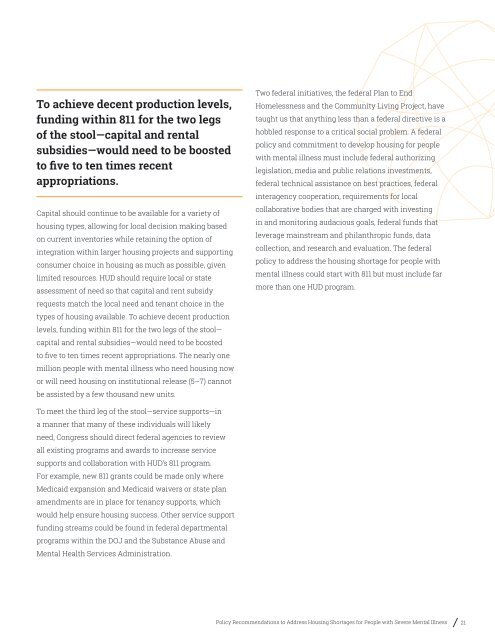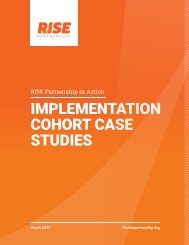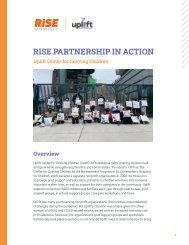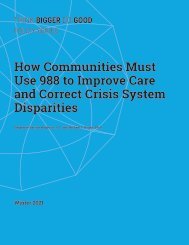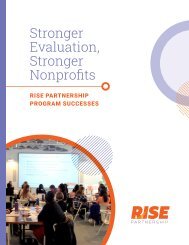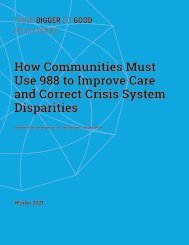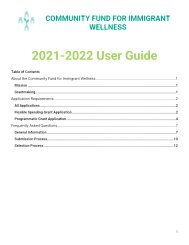Policy Recommendations to Address Housing Shortages for People with Severe Mental Illness
You also want an ePaper? Increase the reach of your titles
YUMPU automatically turns print PDFs into web optimized ePapers that Google loves.
To achieve decent production levels,<br />
funding <strong>with</strong>in 811 <strong>for</strong> the two legs<br />
of the s<strong>to</strong>ol—capital and rental<br />
subsidies—would need <strong>to</strong> be boosted<br />
<strong>to</strong> five <strong>to</strong> ten times recent<br />
appropriations.<br />
Capital should continue <strong>to</strong> be available <strong>for</strong> a variety of<br />
housing types, allowing <strong>for</strong> local decision making based<br />
on current inven<strong>to</strong>ries while retaining the option of<br />
integration <strong>with</strong>in larger housing projects and supporting<br />
consumer choice in housing as much as possible, given<br />
limited resources. HUD should require local or state<br />
assessment of need so that capital and rent subsidy<br />
requests match the local need and tenant choice in the<br />
types of housing available. To achieve decent production<br />
levels, funding <strong>with</strong>in 811 <strong>for</strong> the two legs of the s<strong>to</strong>ol—<br />
capital and rental subsidies—would need <strong>to</strong> be boosted<br />
<strong>to</strong> five <strong>to</strong> ten times recent appropriations. The nearly one<br />
million people <strong>with</strong> mental illness who need housing now<br />
or will need housing on institutional release (5–7) cannot<br />
be assisted by a few thousand new units.<br />
Two federal initiatives, the federal Plan <strong>to</strong> End<br />
Homelessness and the Community Living Project, have<br />
taught us that anything less than a federal directive is a<br />
hobbled response <strong>to</strong> a critical social problem. A federal<br />
policy and commitment <strong>to</strong> develop housing <strong>for</strong> people<br />
<strong>with</strong> mental illness must include federal authorizing<br />
legislation, media and public relations investments,<br />
federal technical assistance on best practices, federal<br />
interagency cooperation, requirements <strong>for</strong> local<br />
collaborative bodies that are charged <strong>with</strong> investing<br />
in and moni<strong>to</strong>ring audacious goals, federal funds that<br />
leverage mainstream and philanthropic funds, data<br />
collection, and research and evaluation. The federal<br />
policy <strong>to</strong> address the housing shortage <strong>for</strong> people <strong>with</strong><br />
mental illness could start <strong>with</strong> 811 but must include far<br />
more than one HUD program.<br />
To meet the third leg of the s<strong>to</strong>ol—service supports—in<br />
a manner that many of these individuals will likely<br />
need, Congress should direct federal agencies <strong>to</strong> review<br />
all existing programs and awards <strong>to</strong> increase service<br />
supports and collaboration <strong>with</strong> HUD’s 811 program.<br />
For example, new 811 grants could be made only where<br />
Medicaid expansion and Medicaid waivers or state plan<br />
amendments are in place <strong>for</strong> tenancy supports, which<br />
would help ensure housing success. Other service support<br />
funding streams could be found in federal departmental<br />
programs <strong>with</strong>in the DOJ and the Substance Abuse and<br />
<strong>Mental</strong> Health Services Administration.<br />
<strong>Policy</strong> <strong>Recommendations</strong> <strong>to</strong> <strong>Address</strong> <strong>Housing</strong> <strong>Shortages</strong> <strong>for</strong> <strong>People</strong> <strong>with</strong> <strong>Severe</strong> <strong>Mental</strong> <strong>Illness</strong> 21


